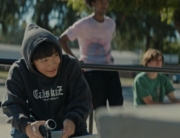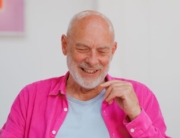By July, it was clear that there were already more than a half-dozen films that could securely claim a spot on a 10 best list. Overall, it was very good year, offering almost something for everyone, and with plenty of notable films hovering below the cut (the austere Paradise trilogy, the awards favorite 12 Years a Slave, the documentaries The Act of Killing and Stories We Tell, and one of the best gay-themed films in years, Yossi, to mention just five). Half here are by directors who have previously appeared on Film-Forward’s end-of-the-year top 10, and two are by debut directors. One takeaway is that it has been a very good year for narrative films from Denmark. (Screenwriters, put aside the often-ascribed how-to manuals, and watch these films for the craft of constructing a story.) The following are our cases for 10 to seek out.
You may want to watch Enough Said to lift your spirits after seeing some of the following films (kidnapping and false accusations to come). A more amicable film would be hard to find. Writer/director Nicole Holofcener’s comedy of manners has awkward yet agile banter that could have been overheard at a party or a late-night rap session, with characters who are as quick on their feet as is the pace. Holofcener easily draws the viewer into the travails of a divorced single mother giving another relationship a try but sabotaging it by her own self-involved impulsiveness. The writer/director serves up a romcon tinged with melancholia. Though the humor wins out, there’s a healthy dose of regret. Kent Turner (In theaters)
From the descriptions of Frances Ha, a film about a 20-something aspiring dancer who can’t quite get it together—whether it’s finding a permanent living situation, making rent, or keeping a steady job—you can almost hear the critics clucking, “What’s to be done about these millennials?” But somehow this work defies expectations. Played by the loose-limbed, physically expressive Greta Gerwig, Frances is often as frustratingly immature as Girls protagonist Hannah Horvath, yet she is still endearingly vulnerable, with an infectious energy that keeps director Noah Baumbach’s realistic world out of the realm of the mundane or tedious. As the black-and-white New York City she inhabits throws up one obstacle after the other, she finds herself faltering, even stumbling, but she still—literally—pirouettes down the street, on to her next adventure. Even those for whom the term “Generation Y” induces an automatic eye roll will find themselves agreeing that “the kids are all right” after this one. (Out on DVD/Streaming video) Mahnaz Dar
The Somali pirates film of the year is A Hijacking. The tense, low-budget Danish drama beats even what director Paul Greengrass achieved with a Hollywood armada and movie star in his based-on-a-true-story thriller Captain Phillips. Writer/director Tobias Lindholm brings to harrowing life a composite of the more typical negotiations and risks facing shipping companies and hostages who have not been rescued by U.S. military might. The docudrama authenticity is heightened by its being filmed in the Indian Ocean on the previously hijacked cargo ship MV Rozen and with the participation of its crew. It’s grounded by the sympathetically individualized portrayals of the seamen working for tough bosses—a Somali and the ship’s cook—and the fraught financial context that drives this violent enterprise will shake the audience. The bottom-line issues involve the cost of doing business vs. the value of people’s lives. (DVD) Nora Lee Mandel
Out of the mouths of babes comes not wisdom but a lie, one that eventually tears apart the life of kindergarten schoolteacher and divorced father Lucas (Mads Mikkelsen) in The Hunt, also from Denmark. When a lonely five-year-old girl, the daughter of one of Lucas’s oldest friends, tells another teacher, out of anger and frustration, that he inappropriately touched her, her words snowball into a vicious manhunt against him. Though The Hunt sounds like it’s evoking the “What really happened?” question surrounding the 1980s McMartin Preschool trials or the haunting documentary Capturing the Friedman, this film is less about sexual abuse itself or what actually occurred. Rather, it’s an intense, fraught exploration of a man struggling to make sense of the life he’s taken for granted as those around him—most of whom have known and cared about him his entire life—begin eyeing him with suspicion. Mikkelsen expertly conveys the full gamut of emotions: rage, grief, confusion, even sympathy and pity for the little girl who unwittingly ignites all this trouble. A harrowing and at times even uncomfortable film to watch, it asks powerful questions and will linger long after it’s over. (DVD) MD
Inside Llewyn Davis is a circular film. It ends very nearly where it begins, but with the hope that down-on-his-luck folk singer Llewyn Davis (a striking Oscar Issac) might one day get off his rotating ride of misery. In some ways, it’s a culmination of all Coen Brothers films: simultaneously funny and sad, dark and light. But what makes this work so affective is its balance among all these things and more. With surprising references to Ulysses, maybe Inside Llewyn Davis is a kind of melancholy follow-up to the much more vibrant Odyssey adaptation, O Brother, Where Art Thou? Davis’s journey is never ending, yet there is a force driving him to keep pushing on, and both films celebrate the transcendent and often lifesaving power of music. Davis has more weight to it, however. That could very well be due to the music. As Davis notes to his audience, “If it was never new, and it never gets old, it’s a folk song.” Like the circular story, like folk music, Inside Llewyn Davis may very well prove to be a timeless film. (In theaters) Megan Fariello
Nebraska is not the first time that Alexander Payne has put his attention to small-town minutiae and tragic-comic discontent in the middle of the country (and in his native state ), but what it has in common with his About Schmidt mostly starts and stops with it being about an older man with a screwy family (don’t we all have ’em?). The unique tenderness felt here about a man duped—or just stubbornly hoping against all other logical odds—that he’s won a million dollars comes from Bob Nelson’s script, which understands how much resentment and petty vibes nestle under the surface. After taking on memorable roles for 50 years, Bruce Dern (remember him in Marnie?) plays a character with such pain and sorrow and such an inner life that he is more than just an irascible old-timer. Nebraska is a fine film about a father and son coming closer together and a better, even masterful film about what it is to be a man, with an ending that is both funny and brings one to tears at the same time. (In theaters) Jack Gattanella
The Past opens with what looks like a happy airport reunion—because we can’t yet hear what a smiling Marie (a very affecting Bérénice Bejo) is saying to Ahmad (Ali Mosaffa) upon his return after several years back home in Tehran. By the next scene, we learn their relationship is more complicated, and the very naturalistic interactions turn exponentially more complex as each scene adds another member to this expanding family or reveals one more facet from the past. While this could have been a Pinter-esque theatrical gimmick (writer/director Asghar Farhadi began in the theater), the family’s humanity is always heartbreakingly central to the escalating tensions because children are involved, especially teenage Lucie (the achingly sympathetic Pauline Burlet). Her misunderstandings of the adult triangles, quadrangles, and tightening circles of love, guilt, depression, and responsibility reap an emotional roller coaster. (In theaters) NLM
There was no sophomore slump for director Derek Cianfrance after his hip and angsty Blue Valentine. For The Place Beyond the Pines, he still aimed for intimacy but on an epic scale in a multigenerational rust belt drama of crime and retribution. Its sense of place and character recalls early 1970s filmmaking combined with the long-form narrative that’s now ubiquitous and the domain of television. It features some of the best performances by a cast in its prime: Ryan Gosling, Bradley Cooper, and Eva Mendes. Maybe no other American director went for broke in telling such a layered story in a compact 140 minutes. Cianfrance thinks big. (DVD/streaming video) KT
This was quite a year for a new subgenre, Girls Gone Gonzo: let’s see, there’s Violet & Daisy, The Bling Ring, and of course, Spring Breakers, but the most incisive (and invasive) was from Israel, S#x Acts, originally called Six Acts. First-time director Jonathan Gurfinkel takes the teenage sexual coming of age to a franker and harsher level that’s highly discomforting and too intense to be considered sexy. Six chapters relate the degrees of degradation of a 16-year-old new girl in school, Gili. She’s starting from scratch, hooking up (in all meanings) with the popular, rich, hot guys. Gili’s not easy to categorize; she’s neither a victim nor a completely self-aware teen. Self-defensive or a bit boastful, she tells a clique of seniors that she’s using the boys, instead of the other way around. The film is also noteworthy for the breakout role by Sivan Levy as the vulnerable and hard-shelled teenager. Parents, have your smelling salts handy. (Tribeca on Demand) KT
Jia Zhangke, one of the greatest chroniclers of modern China, delivers his angriest, most urgent and impassioned work yet. A Touch of Sin tells four interrelated stories of violence—drawn from actual incidents—told with the vibrant immediacy of pulp fiction and the dramatic sweep of Chinese opera. Conceived as a contemporary version of classic martial arts movies, the film sounds a loud warning about the dangers of unbridled materialism and the growing gap between the haves and the have-nots. The power of Jia’s filmmaking has certainly touched a nerve, though not with the Chinese public, who has not yet been allowed to see it, but with the authorities, who now have Jia fighting to have his film released, even though it had previously been approved by the censors. This attempted suppression only buttresses Jia’s case that China continues to ignore criticism only at its ultimate peril. (In theaters) Christopher Bourne










Leave A Comment